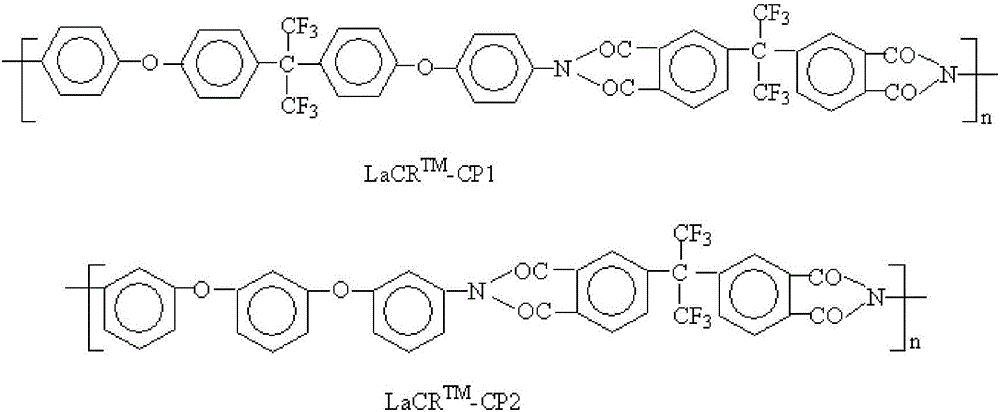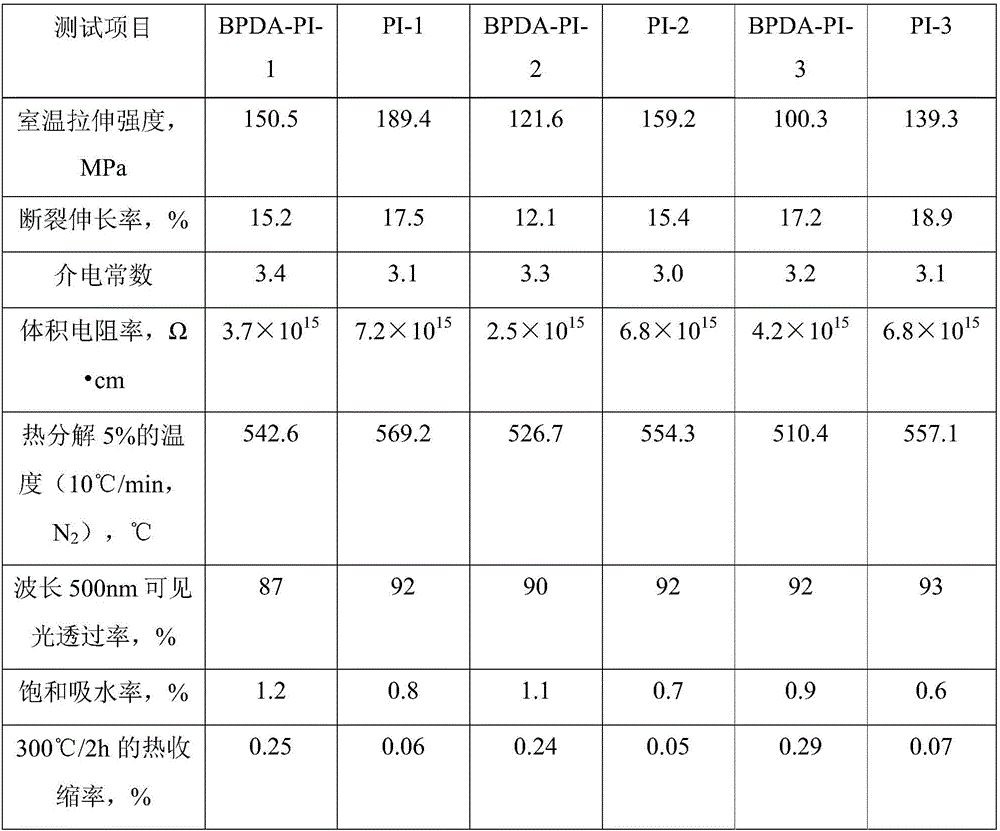BPDA type bisphenol A tetramine branched polyimide resin thin film and preparation method thereof
A technology of polyimide resin and polyamic acid resin, which is applied in the field of polyimide film and its preparation, can solve the problem that it is difficult to obtain high molecular weight polyimide resin, the comprehensive performance of film products is reduced, and the cost of film products is reduced. Advanced problems, to achieve the effect of excellent dimensional stability, significant comprehensive performance superiority, excellent electrical properties and optical properties
- Summary
- Abstract
- Description
- Claims
- Application Information
AI Technical Summary
Problems solved by technology
Method used
Image
Examples
Embodiment 1
[0035] Add 180.0 g (0.9 mol) of 4,4'-diaminodiphenyl ether (DADPE), 10.8 (0.1 mol) of p-phenylenediamine (PPDA) and 1470 g of N,N-dimethylacetamide (DMAc) to the polymerization In the bottle, stir at room temperature. After completely dissolving, cool in an ice-water bath to below 5°C, add 297.1 grams (1.01 moles) of 3,3',4,4'-biphenyltetracarboxylic dianhydride (BPDA), stir, and 5 After reacting at °C for 1 hour, 1957.9 g of a homogeneous, transparent and viscous BPDA-type polyamic acid resin solution was obtained, which was designated as BPDA-PAA-1. Using Brookfield CAP2000+ vertebral plate viscometer, its viscosity at 50°C is measured as 630mPa.s. .
Embodiment 2
[0037] 262.8 grams (0.9 moles) of 1,4-bis(4-aminophenoxy)benzene (144BAPB), 10.8 grams (0.1 moles) of m-phenylenediamine (MPDA), 2000 grams of N,N-dimethylacetamide ( DMAc) and 920 grams of N-methyl-2-pyrrolidone (NMP) were added to the polymerization bottle, stirred at room temperature, after they were completely dissolved, cooled in an ice-water bath to below 5°C, and 308.9 grams (1.05 moles) of 3,3',4 , 4'-biphenyltetracarboxylic dianhydride (BPDA), stirred, and after 4 hours of reaction at 8°C, 3502.5 grams of homogeneous, transparent, viscous BPDA-type polyamic acid resin solution was obtained, which was recorded as BPDA-PAA- 2. Using Brookfield CAP2000+ vertebral plate viscometer, the viscosity at 50°C was measured as 572mPa.s.
Embodiment 3
[0039] 51.8 g (0.1 mole) of 2,2-bis[4-(4-aminophenoxy)phenyl]hexafluoropropane (BAPFP), 180.0 g (0.9 mole) of 4,4'-diaminodiphenyl ether (DADPE ) and 3,290 grams of N-methyl-2-pyrrolidone (NMP) were added to the polymerization bottle, stirred at room temperature, and after they were completely dissolved, they were cooled in an ice-water bath to below 5°C, and 317.7 grams (1.08 moles) of 3,3',4, 4'-biphenyltetracarboxylic dianhydride (BPDA), stirred, reacted at 10°C for 6 hours, and obtained 3839.5 grams of homogeneous, transparent, viscous BPDA-type polyamic acid resin solution, recorded as BPDA-PAA-3 . Using Brookfield CAP2000+ vertebral plate viscometer, its viscosity at 50°C is measured as 425mPa.s.
PUM
| Property | Measurement | Unit |
|---|---|---|
| Viscosity | aaaaa | aaaaa |
| Viscosity | aaaaa | aaaaa |
Abstract
Description
Claims
Application Information
 Login to View More
Login to View More - R&D
- Intellectual Property
- Life Sciences
- Materials
- Tech Scout
- Unparalleled Data Quality
- Higher Quality Content
- 60% Fewer Hallucinations
Browse by: Latest US Patents, China's latest patents, Technical Efficacy Thesaurus, Application Domain, Technology Topic, Popular Technical Reports.
© 2025 PatSnap. All rights reserved.Legal|Privacy policy|Modern Slavery Act Transparency Statement|Sitemap|About US| Contact US: help@patsnap.com


